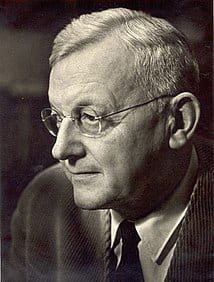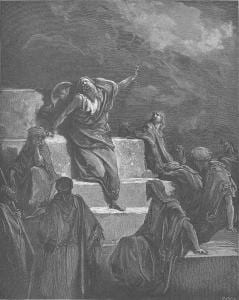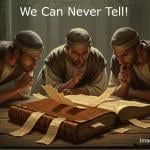 Let me indulge today in a bit of scholarly talk about the Hebrew Bible that I hope will lead to a useful discussion of what preaching from this text in Lent might mean. Gerhard von Rad (1901-1971) was a widely influential German scholar of the Old Testament. For von Rad, the Hebrew Bible was neither literature nor history, but in fact the written confessions of the people of Israel. Though that statement may be ultimately true about his work, any reading of his significant writings suggest a deep appreciation for and a lively engagement with the biblical text as literature (his still quite wonderful commentary on Genesis is one parade example), along with a concern for the history that may be found there, as long as that history illumines the confessional nature of the texts. Deut.26:1-11 was for von Rad a very important text, for here he found the basis for what he came to call the “kleine Credo” of Israel, that is the “little creed” that served as the backbone of what Israel finally believed about their literary history.
Let me indulge today in a bit of scholarly talk about the Hebrew Bible that I hope will lead to a useful discussion of what preaching from this text in Lent might mean. Gerhard von Rad (1901-1971) was a widely influential German scholar of the Old Testament. For von Rad, the Hebrew Bible was neither literature nor history, but in fact the written confessions of the people of Israel. Though that statement may be ultimately true about his work, any reading of his significant writings suggest a deep appreciation for and a lively engagement with the biblical text as literature (his still quite wonderful commentary on Genesis is one parade example), along with a concern for the history that may be found there, as long as that history illumines the confessional nature of the texts. Deut.26:1-11 was for von Rad a very important text, for here he found the basis for what he came to call the “kleine Credo” of Israel, that is the “little creed” that served as the backbone of what Israel finally believed about their literary history.
This Israelite “creed” is found in Deut.26:5-9: “A wandering (or perhaps “perishing”) Aramean was my ancestor. He went down to Egypt and lived there a stranger (ger), few in number. It happened there that he became a great nation, strong and numerous. Then the Egyptians treated us cruelly and afflicted us with hard labor; we cried out to YHWH, God of our ancestors who heard our voice and saw our affliction and toil and our oppression. YHWH led us out of Egypt with a powerful hand and an outstretched arm, with great terror and signs and wonders; God brought us into this place and gave us this land, a land flowing with milk and honey.” That is a marvelous summary of what sustained Israel through its long history of struggle to survive, trapped as it was between vast and hungry empires, both east and west of its tiny land, Egyptians to the west, Assyrians and Babylonians to the east. This creed, or close examples of it, appears in several significant places in the Hebrew Bible (see, for example, Joshua 24, for an expanded version).
Von Rad noticed that none of these small credos included mention of the giving of the law on Sinai, moving from Egyptian escape directly to the entry into the land of promise. He concluded from that observation that the tradition of the giving of the law was a later one, and was not integrally part of the oldest stratum of Israelite belief. That particular claim has been often debated in the scholarly guild since von Rad’s formulation of it, but I will spare you the intricacies of that rather abstruse discussion. Suffice it to say that here in Deuteronomy, worshippers are enjoined, as they bring their gifts of first fruits to God, to recite this particular confession of historical/literary belief.
And exactly why should they do that? Because on that creed rests the very reasons for their belief in this God and the actions they must take in response to that belief. Those who forget the creed lose the rationale for worship and practice completely. Jeremiah, with a clear reference to the ancient creed, makes the point. In one of his earliest recorded oracles he shows the result of the loss of the creed. “What wrong did your ancestors find in me that they went far from me, going after worthless things and becoming worthless themselves,” says YHWH? “They did not say, ‘Where is YHWH who brought us up from the land of Egypt, who led us in the wilderness, a place of deserts and pits, a land of drought and deep darkness, where no one lives? I brought you into a plentiful land to eat of its fruits…..The priests did not say, ‘Where is YHWH? The handlers of Torah do not know me. The shepherds (the rulers) sinned against me; the prophets prophesied by Baal’” (Jer.2:5-8)! According to Jeremiah, looking askance at his community late in the 7th century as it faces annihilation by the Babylonians, announces that the creed of Israel has been forgotten or misused by all leaders of the Judean congregation. The elders stopped referring to YHWH’s gift of freedom from Egyptian bondage, as well as YHWH’s gift of the land in which they now live; the priests have no interest in YHWH at all; the experts in Torah do not even claim to know YHWH or at least their claims to know YHWH are false; the prophets no longer announce “thus says YHWH,” but turn to Baal as their supposed inspiration. In short, Judah has completely forgotten the creed, and as a result they have completely forgotten what has made them who they have been and who they hope to be. To lose the creed is to lose the reason for living a life rooted in and directed by God.
And that truth is no different in 2019. Our confusion about what God has done for us too often leads us down paths of peculiar and dangerous activities. I am thinking today of the recently concluded called General Conference of my denomination, the United Methodist Church. The result of that conference to me was nothing short of disastrous, as a very conservative plan of action was voted on to the exclusion of another plan that promised far more openness and freedom, especially for our LGBTQIA siblings and their allies. Many are currently reeling from this decision and struggling to determine what to do next. The final upshot of the conference remains to be seen; the next weeks, months, and years will determine the future of our denomination.
What appears certain to me about the appalling decision to bring forward such a restrictive view of our church is that many of the delegates to the conference had plainly forgotten what God had done for them and for their colleagues in the faith of God in Jesus Christ. Rather than focus full attention on a handful of Bible verses that purport to name same sex relationships as sinful (even though they clearly do not say that), those delegates forgot the central creed of our faith. “Love one another as I have loved you.” “Those who say they love their brother and sister, but do not show that love, are liars.” God has acted freely and fully for all of God’s children, offering a full freedom from slavery, a rich gift of God’s teaching, an overflowing world of lush beauty and bounty, and for those of us who are Christians, the unbreakable love of God in Jesus.
It is crucial to proclaim clearly and forcefully exactly what one rests one’s faith on. For Christians, if the central claim of that faith is not bounded by the love offered by God to all, then that faith is seriously lacking and runs the risk of misrepresentation and error. And errors in faith, as we United Methodists have just witnessed, have dangerous consequences for whole groups of people who have been created and are loved by the one God of us all. As we begin another Lenten season, let us all strive to come clean about what we remember about God’s gifts to us and announce those truths so that all may see in us the God of the whole world, not some lesser god of only the few.
(Images from Wikimedia Commons)












